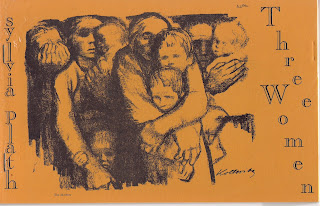As mentioned in a previous post, there was one item at the 32nd annual Boston International Antiquarian Book Fair that I had never seen and did not know existed. This title, The Bell Jar, is familiar to us all as being a book written and published by Sylvia Plath. The true first edition was published in England under a pseudonym, and in 1966, under her own name. In 1971, the book made a huge splash when it was published in her birth country for the first time. The "hotness" of the book and the sensation it caused when it was published lead someone in Taipei, Taiwan to issue a pirated copy in that country. Obviously Plath's book wasn't the only book pirated in Taiwan, but it's the only one we care about here...
Aside from the copy offered for sale at the Boston Book Fair, WorldCat lists five other copies of The Bell Jar with the issuing city of publication being Taipei, Taiwan. These are purportedly held in the following libraries: University of North Carolina, Chapel Hill; Lakeshores Library System in Waterford, Wisc.; Middle Georgia Regional Library in Macon, Geo.; Annie L Awbrey Public Library in Roanoke, Ala.; and the Harris County Public Library in Houston, Tex.
A search of UNC-Chapel Hill's catalog confirmed their holding this title in their Rare Book Collection. In corresponding with a librarian there, their copy has maroon cloth over the boards, but otherwise appears to be similar to the copy I saw at the fair. The Harris County Public Library no longer owns a copy of this, according to a librarian there. I have additional inquiry emails out at present and will report back what I learn but am not hopeful that these other libraries hold, in fact, this copy.
The dust jacket on this pirated edition of The Bell Jar replicates that of the first American edition, and it is clearly a very bad reproduction - likely a color photocopy. The copy I saw has green cloth over boards; and the cloth was so poorly adhered that it bubbled up in spots. On the spine of the book, the author and title are stamped in silver. Sylvia Plath is written in a cursive or italic script.
In thickness, the pirated edition is about a half inch slimmer than that of the first American edition. This is due to the poor quality and thinness of the paper used. A previous owners label was affixed inside the front board, at the top right. On the verso of the half-title page, where Plath's previous books are listed, is a block of text in Chinese. The text translates to:
Publisher (person): Pei-ran Chang
Address: Taipei, Chung-Shan North Rd., Section 2, No. 89-6
Publisher (company): Jinshan (Golden Gate) Books Publishing Company
Distribution: Jinshan Books and Stationary Company
Phone #: 555700, or 549977
Printer: Da-Xing Books Printing Company
Address: Sanchung City, San-he Rd. Section 4, No. 151
R.O.C. Year 60 (1971)
Registration # in Taiwan #1389
The copyright page states that the book is "First U.S. Edition". But, that just means obviously that they reproduced a first American edition. Normally pirated materials remain anonymous, which makes the presence of such detailed information about the publisher & printer quite odd.
It is not known when or how many copies of the book was published in this pirated edition, but the information given in WorldCat suggests possibly 1972 (drawn from UNC-Chapel Hill's wonderful cataloging). I was able to obtain scans of the book and hope that they are useful in illustrating this posting. A coworker's wife provided the translation of the Chinese.
Plath's poem "Three Women" was also pirated; though information found in Stephen Tabor's Sylvia Plath: An Analytical Bibliography suggests it was an "inside job" done in Oakland, California, in the early to mid 1970s. This book is oblong in size, and with a mustard yellow cover (to match Max Nix's suit!). "Three Women" was published in a beautiful limited edition in 1968 by Turret Books and includes an Introductory Note by Douglas Cleverdon; this preceeds its appearance in Winter Trees by three years.
Plath's poem "Three Women" was also pirated; though information found in Stephen Tabor's Sylvia Plath: An Analytical Bibliography suggests it was an "inside job" done in Oakland, California, in the early to mid 1970s. This book is oblong in size, and with a mustard yellow cover (to match Max Nix's suit!). "Three Women" was published in a beautiful limited edition in 1968 by Turret Books and includes an Introductory Note by Douglas Cleverdon; this preceeds its appearance in Winter Trees by three years.


